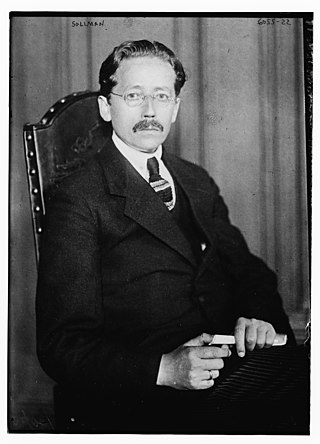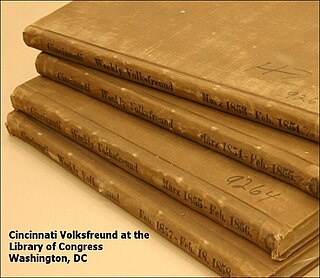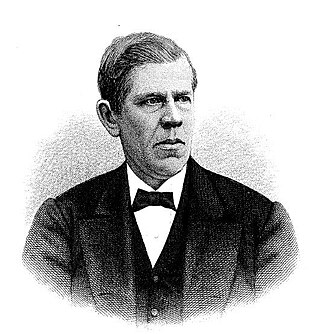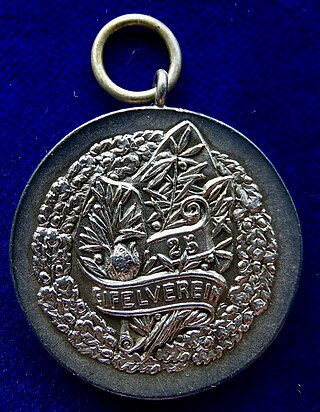
The Moselle is a river that rises in the Vosges mountains and flows through north-eastern France and Luxembourg to western Germany. It is a left bank tributary of the Rhine, which it joins at Koblenz. A small part of Belgium is in its basin as it includes the Sauer and the Our.

Friedrich Wilhelm Sollmann, later William Frederick Sollmann was a German journalist, politician, and interior minister of the Weimar Republic. In 1919, he was on the staff of the German delegation that was to receive the Treaty of Versailles. In 1933, he emigrated and eventually moved to the United States where he became an advocate for the peaceful resolution of conflicts.

The Cincinnati Volksfreund was a daily and weekly German-language newspaper that was based in Cincinnati, Ohio, and published between 1850 and 1908 with offices located on the southwest corner of Vine and Longworth Streets.
Der Volksfreund was a German language newspaper published in Buffalo, New York, on and off from 1868 to 2009. Its editorial tendencies were Roman Catholic and Democratic. The paper flourished chiefly during the last decade of the 19th century until World War I under its publisher Matthias Rohr. Originally a gymnasium professor of modern languages in the Rhenish Palatinate in Germany, Rohr emigrated to the United States and was active as a publisher and insurance agent.
Luxembourger Americans are Americans of Luxembourgish ancestry. According to the United States' 2000 census, there were 45,139 Americans of full or partial Luxembourgish descent. In 1940, the number of Americans with Luxembourgish ancestry was around 100,000.

Joseph Anton Hemann was a German-American educator, newspaper publisher, and banker.

Luxemburger Wort is a German-language Luxembourgish daily newspaper. There is an English edition named the Luxembourg Times. It is owned by Mediahuis Luxembourg.

Kenn is a municipality situated in the western region of Rhineland-Palatinate, near the border with Luxembourg. It is characterized by its encompassing red sandstone hills adorned with vineyards and located within the Moselle wine region. Administratively, Kenn falls under the jurisdiction of the Verbandsgemeinde Schweich an der Römischen Weinstraße in the Trier-Saarburg district.

The Erbeskopf is a mountain in the Hunsrück range in central Germany. At a height of 816 metres (2,677 ft), it is the highest point in the state of Rhineland-Palatinate, as well as the highest point of German territory on the western bank of the Rhine. It lies within the Saar-Hunsrück Nature Park.
Der Hochwächter, literally "The High Guard", was a German-language newspaper published in Cincinnati, Ohio, United States. It was published from 1845 to 1849.
Der Wahrheitsfreund or Der Wahrheits-Freund was the first German language Catholic newspaper in the United States, and one of many German-language newspapers in Cincinnati, Ohio during the nineteenth century. It was published by the Roman Catholic Archdiocese of Cincinnati, and proceeds went to the St. Aloysius Orphan Society.
General elections were held in Luxembourg on 28 September 1848. They were the first direct elections to the Chamber of Deputies. Doctrinaire Liberals, who had been in power since 1841, lost the election to progressive Liberals and Catholics who were supportive of the new constitution.

The Trier West Railway a 14 km-long railway line running from Trier-Ehrang in the German state of Rhineland-Palatinate to Wasserbillig in Luxembourg via Trier-West. The double-track, electrified section between Trier-Ehrang and the Moselle bridge at Konz forms a bypass of the Trier rail node.

The Eifel Club is one of the largest rambling clubs in Germany with a membership of 28.000. Its purpose is the "maintenance of local customs, the protection and care of monuments to which it is particularly committed".

Don Beck is an American professional basketball coach.

Reinhold Breu is a German football manager and former player who works as technical director of the Lithuania national football team.

Lena Werner is a German politician of the Social Democratic Party (SPD) who has been serving as a member of the Bundestag since 2021.
Partial general elections were held in Luxembourg on 8 June 1869, electing 20 members of the Chamber of Deputies. The elections took place in Capellen, Clervaux, Diekirch, Grevenmacher, Luxembourg City, Redange, and Vianden.
Der Volksfreund was a Luxembourgish newspaper appearing 2-3 times a week from 1848 to 1849. Founded during the politically turbulent period after the 1848 Revolution and the granting of a new constitution, it had strong personal ties to members of the Fontaine government and followed a pro-government line, attacking the opposition.











